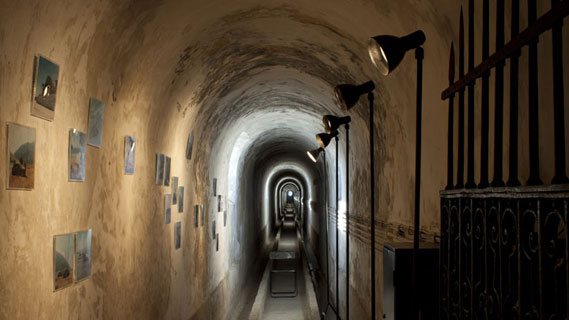 CURATED BY JOSEPH GRIMA
CURATED BY JOSEPH GRIMA
The ultimate defect of projects—they die—takes us back to their beginnings: they were condemned from the start because some crazy engineers had mistaken dreams for reality. […] Yes, you have to reread your Hegel because, you know, technological reality isn’t rational, and it’s no good rationalizing it after the fact.
Bruno Latour, ARAMIS or the love of Technology
Since the dawn of time, man’s greatest dreams, challenges and, ultimately, accomplishments have materialised in works of infrastructure. From Babylonian hydraulics to the geoengineered archipelagos of the twenty-first century, great infrastructural works represent the apex of design complexity and achievement—and often, by virtue of their sheer magnitude, the most tangible expression of a culture’s development, ambition and might. Canals, power plants, fortifications, reclaimed lands, particle accelerators, aqueducts, suspension bridges, dams: infrastructure is justifiably held up as the register of society’s collective accomplishment and the historical benchmark of its leaders’ enlightenment.
Encumbered with such momentous responsibility, infrastructure inevitably also comes to immortalise society’s most catastrophic failures. Such debacles surround us: the infrastructural coitus interruptus of countless politician’s pet projects, stalled by a myriad of financial crises; China’s infamous ghost cities and America’s abandoned shopping malls; the abandoned concrete carcasses of unfinished hotels scattered along the banks of the Red Sea; the 3,400 airports built in the ‘70s and ‘80s throughout the former Soviet Union that today lie abandoned, victims of the market economy’s relentless drive towards centralisation.
Yet failure can in itself be as revealing as success. Utilitas Interrupta sets out to closely examine infrastructural works that no longer satisfy the Vitruvian prerequisite of usefulness: projects once celebrated and now forgotten, reminders of a long-gone (or not so long-gone) optimism that lie concealed in plain sight, magically erased from collective consciousness despite their often gargantuan proportions. Like scars indelibly etched into the landscape, these structures are the repositories of forgotten stories of zeal and passion, neglected then swept aside like lovers no longer able to please.
This exhibition investigates seventeen case studies, transversally sampled from various points in time and space. Infrastructure rendered obsolete by the indomitable pressure of technological progress; the infrastructure of paranoia, useless by definition; vanity infrastructure, purposeless except as proof of its own existence; the foiled infrastructure of honourable ideals and unfulfilled intentions; the dilapidated infrastructure of misfortune and catastrophe; the infrastructure of the absurd, the comical and the tragic—stories of heroic deeds in which the cure is recognised as worse than the disease.
If the landscape is the backdrop against which the epic of history is acted out, these infrastructural scars are a forceful reminder that history as we know it is but one of the many possible—and equally compelling—storylines.
—
Joseph Grima
Curator Joseph Grima/
Associate Curator Elian Stefa/
Graphic Design Neil Donnelly/
With contributions Alicja Dobrucka, Armin Linke, Bertin & CIE, Bogdan Stojanovic, Bruce Sterling,
Elian Stefa, Gaia Cambiaggi, Geoff Manaugh, Grégoire Basdevant, Haubitz+Zoche, Igor Kuznetsov, Igor Sharovatov, Ivan Kuryachiy, Jessica Russell, Minkoo Kang, Nicola Twilley, Noah Sheldon, Sergey Kulikov, Ulrich Pohlmann/
Photo: © 2011, EXD'11/ Rodrigo Peixoto



